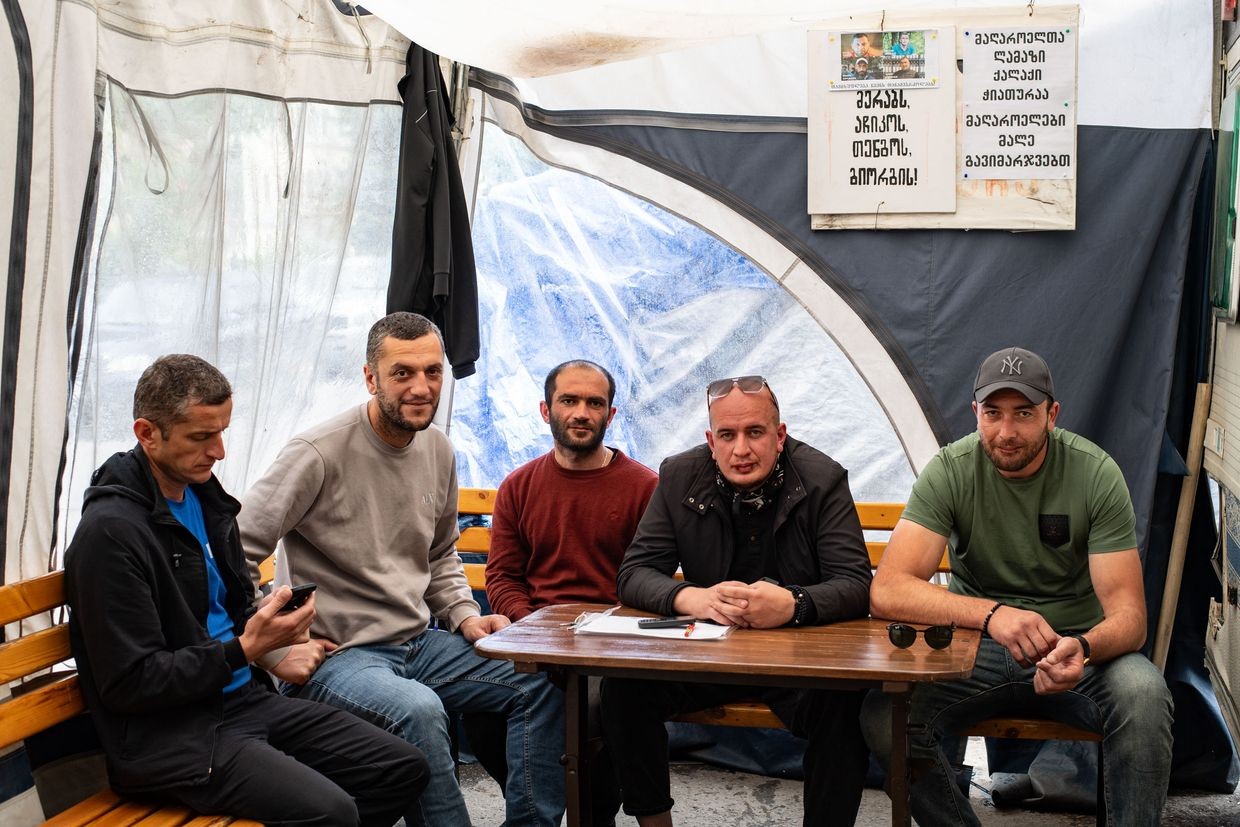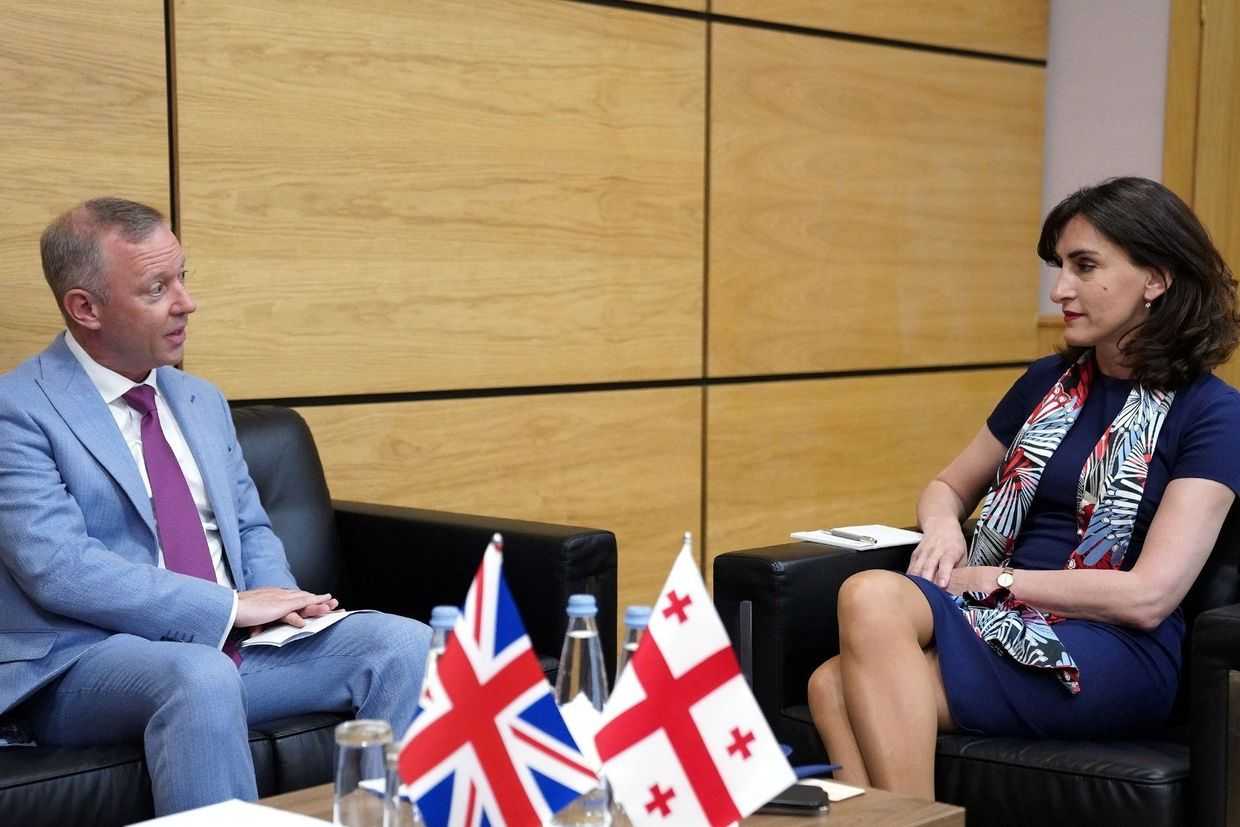‘Police are laughing at us’ — Chiatura miners on hunger strike to secure their colleagues’ release

Content warning: Some of the pictures below show protesters with their mouths sewn shut.
The hunger strike by a group of miners in Chiatura has entered its third week. Over the past several days, two of them have escalated their strike by refusing to ingest any liquids. The main demand of the hunger strikers remains the release of protest leaders who were arrested in April.
On Thursday, the health condition of Tariel Mikatsadze, one of the miners on a dry hunger strike, worsened. According to his colleagues, after refusing both water and glucose, his blood sugar level dropped to a critical point. The miners called an ambulance twice, but Mikatsadze also refused to accept medical assistance.

In total, seven miners in Chiatura have joined the hunger strike that began on 19 June. One of them, Merab Saralidze, is in prison. The strikers demand the release of Saralidze and three others arrested along with him — Archil Chumburidze, who is also a miner, and Tengiz Gvelesiani and Giorgi Neparidze, who are not miners but were actively involved in the protest.
Five miners are in a tent set up in the central part of Chiatura, while another one, Jano Labadze, is in a tent set up in the village of Shukruti, which is on a brink of collapse due to mining works under the village. Labadze has gone on several hunger strikes since 2019: that year, he sewed his lips shut alongside seven others for 30 days. In 2024, he went on a 42-day hunger strike with his fellow villagers in protest against the company. He has again joined this recent hunger strike with miners against Georgian Manganese, calling for the release of his fellow protesters, one of whom he says is his close friend.

In total, three of the hunger strikers have sewn their lips shut in protest. Among them is Mirza Loladze, who, like Mikatsadze, switched to a dry hunger strike on Thursday. According to the miners, as a result, his blood sugar level also dropped.




‘Given the situation in the country, I no longer see any legal solution left. This is the only option — self-harm and self-destruction — because it seems that nothing and no one can change this regime without sacrifices’, Mikatsadze told OC Media.
Despite numerous attempts by the miners to engage with the authorities, not only have they failed to receive proper attention, but according to Mikatsadze, the police even mock them.
‘The police chiefs are laughing at us, saying: “so what, go ahead and starve, you’ll faint, you’ll face heart issues, then [doctors] look after you in the hospital” ’.
‘They calculated it precisely’
The protest began in Chiatura at the end of February, and consisted of a series of demands directed at the miners’ employer, including the restoration of underground operations in the mines — work that the mining company Georgian Manganese had suspended in October, citing ‘financial unprofitability’.
The miners stated that the shuttering of operations was causing serious financial hardship for the town, whose residents rely primarily on mining as their source of income — Georgian Manganese is the largest employer in the town.
‘[At first] the protest was going quite successfully: wages were paid during that period, and alongside that, talks began about resuming [underground] work’, Mikatsadze added.
However, the restart of the work process came with certain conditions, one of which was a ‘reorganisation’ announced on 22 April — something the miners expected to leave many of them unemployed.
A week after this announcement, police detained four protest leaders, which fundamentally changed the agenda of their colleagues.
‘When they couldn’t break us in any way — neither with provocative statements nor with actions — then they managed to arrest our four comrades completely illegally and unfairly, Mikatsadze said, adding that ‘after their arrest, our demands and chances changed radically. They had calculated it precisely and achieved exactly what they intended’.
The miners were jailed for reportedly attacking the head of the mining company after he allegedly called them a ‘herd of cattle’.

Saralidze and Neparidze were later charged with organising and participating in group violence, an offence that carries a prison sentence of six to nine years. Chumburidze and Gvelesiani, meanwhile, have been accused of participating in a group offence, which is punishable by four to six years in prison.
The miners repeatedly tried to secure the release of their colleagues from prison, including by ending another hunger strike they had launched in April to protest the reorganisation.
Mikatsadze stated that certain individuals — including people speaking on behalf of Prime Minister Irakli Kobakhidze — promised that if they stopped the hunger strike and did not interfere with the miners who had accepted the reorganisation, the detainees would be released.


‘However, a court hearing was held on 12 June, and the guys were kept in [pre-trial detention], which revealed the suspicion that this was simply a trap,’ he added.
‘No one can say that we’re radicals’
Davit Chinchaladze is one of the miners who joined the now four-month-long protest from the very first days. Like Mikatsadze, he emphasised that the arrest of their colleagues pushed back all of their initial demands related to labor conditions and the town’s economy.
‘[Sewing one’s lips shut] is hard, but what is even harder is that our four comrades are being held in prison completely unjustly’, he added, speaking about the extreme forms of protest some miners have adopted.
‘No one can say that we are radicals […] we tried everything to keep our truth within a constructive framework and to prove it that way […] we went to all the emergency and pre-scheduled meetings, offering the company ways to get out of the crisis’, he added.

Chinchaladze added that at the 12 June hearing, the judge kept the miners in custody based on ‘far-fetched’ arguments, claiming the defendants could exert pressure on witnesses.
‘This is absurd, because these witnesses are not just people off the street or ordinary employees — they are high-ranking company officials […] there is no way we could physically exert any influence on such people’.
Despite their priorities changing, the miners have not forgotten their labour demands. Since there is not a wide trust among miners toward the Georgian Trade Unions Confederation (GTUC) — the country’s mainstream union body — in June they registered their own independent union group.
‘We have 300–400 members, but we want to have a majority. Then we will present our demands to the company, and among them will definitely be the restoration of all the rights that workers have lost’, Mikatsadze said.
According to him, in the end, more than half of the employees signed the reorganisation document, but only a small number were called back to work, while the others are still waiting.
‘The entire state and business machinery was involved in neutralising, dismantling, and fragmenting the working class, and they partly succeeded’, he added.
Mikatsadze said that the employees who have returned to work are ‘under intense pressure’ and, because of staff shortages, are forced to do work that would normally require a larger workforce.

He believes the Georgian Manganese’s goal is to switch to open-pit manganese mining, which is cheaper, while retaining some underground mines with workers who will not raise major demands about labor conditions.
‘For example, when employees want to join our union, company directors and foremen directly tell them that if they switch to an independent union, their salaries will be reduced by at least ₾300 ($110)’, he noted.
OC Media has contacted the Georgian Manganese for comment, but has not received an answer.
The next court hearing for the detained miners is scheduled for 17 July. In the meantime, their colleagues have vowed to continue their protest.
‘We are not going to back down — this is our final decision’, Mikatsadze said.








